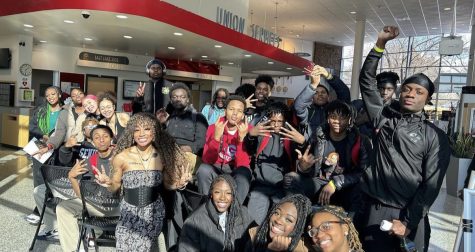Lunch policy is complicated
STUDENTS have varying opinions on school lunch; this makes sense when the fact that most students eat it is taken into consideration. Around the country, 30.5 million lunches are served each day.
It is so commonplace; people often do not contemplate it much. However, because sustenance has such a tremendous impact on a person’s ability to function and concentrate, it’s a big deal.
“Yeah, I eat school lunch every day. I think they could do better, but it fills your tummy,” said Veronica Gonzalez (10). The opinion that school lunch could be better is shared by many.
“It’s good, but it’s not the healthiest food out there. I don’t eat home lunch ‘cause I forget to pack it, but home lunch is healthier,” Aizy Kate Olsen (11) said. Health is a big concern among students and parents alike.
It was such a big concern that the way school lunch is organized changed in 2010, with the Healthy Hunger-Free Kids Act, or HHFKA. This law, proposed by Michelle Obama, changed portion sizes for certain food groups, while limiting the amount of caloric intake.
This change, reportedly, caused a great impact on the quality of food by increasing the amount of fruit and vegetables that are consumed. “I think that’s good. Every day, people eat pizza and it has a lot of grease. If people eat healthier, they will be able to do better in school,” said Gonzalez.
Others are not so convinced of this change. “I haven’t eaten school lunch regularly since sixth grade. I just skip lunch. I don’t eat it because it’s not the greatest. No matter what you get, there’s always something wrong that makes it disgusting and gets you sick,” Jessica Depriest (12) said.
In fear of these adverse effects, many students think the restrictions need to go further. “They put more things that are claimed to be healthy in our schools. For example, the vending machines are full of diet sodas packed with fake sugars and unneeded sodium, which can be very bad for us.” Sure, they are healthier calorie and sugar wise, but it’s not going to benefit us in the long run,” Olsen said.
In contrast, others think that it has already gone too far. “I think we should be able to eat whatever we want to eat, no matter the consequence. Yeah, we may become obese or fat, but that’s not going to stop us from eating junk food when we get home. We should be able to make our own choices,” said Samantha Haddenham (12).
Other students feel similarly. “I think Michelle has gone too far with it. I understand that she wants to make people healthy, but in a couple years, they’ll have to choose what they want to eat, and they won’t make the right choices. I don’t think taking away options is the best way to do it,” Depriest said.
Lots of students have strong opinions on school lunch. No matter the opinion on school lunch, it needs to be expressed because it’s something that has to be confronted every day. Discussing a view on something is the only way to make any real change.









